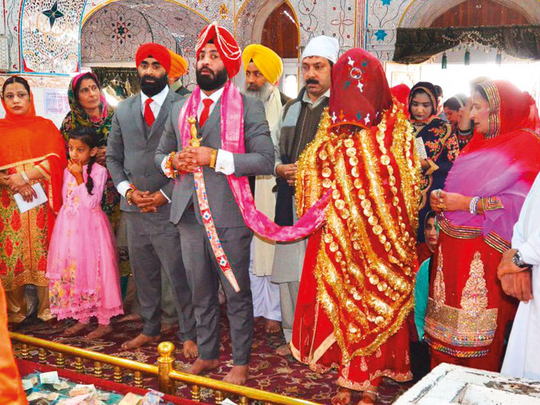
Islamabad: The Punjab Assembly passed a landmark legislation on Wednesday to regulate marriages of the minority Sikh community in the province.
The much-awaited ‘Anand Karaj Marriages Act 2017’ would provide legal status to Sikh marriages in Punjab.
The bill was first moved by Punjab Assembly’s first Sikh member, Sardar Ramesh Singh Arora, in 2017 and was signed by Punjab Chief Minister Shahbaz Sharif last week. The new bill has effectively repealed the Anand Marriage Act, 1909, that was passed by the British.
MPA (Member of Provincial Assembly) Arora termed the legislation a “historic moment” for the people of Punjab and said “Pakistan [will be] the only country in the world to register Sikh marriages”.
Once the bill has been approved by the Punjab governor, every Sikh marriage that took place before the bill came into force would also gain legal status. Previously, the records of Sikh marriages were maintained in a Gurdwara.
According to the bill, a Sikh marriage ceremony or Anand Karaj (Blissful Union), will be performed in accordance with the religious practices as permitted in the Sikh religious text Guru Granth Sahib.
According to the bill, any marriage ceremony that takes place between a Sikh male and female would be recognised by the government as long as the bride and groom are above the age of 18 and enter into marriage contract with their free and full consent.
Legal guidelines
A duly completed and signed Sikh marriage form shall be submitted to the marriage registrar, who will be appointed soon, and notified to the union council within 30 days of the date of marriage. A “marriage deed”, a legal document authorising the matrimonial union, will then be issued by the registrar.
Besides, all marriages between Sikhs including the ones solemnised before the law, would be registered with the relevant union council.
The bill also lays down legal guidelines for those eligible for marriage, rules for dissolution and child support or “maintenance” following the dissolution.
In case a “party” seeks to “dissolve the marriage”, he/she must submit a written note to the Chairman or any official authorised by the government as well as their partner. The chairman would then constitute an “arbitration council” within 30 days of receiving the note to facilitate reconciliation. However, if “reconciliation is not effected within 90 days from the notice date”, the chairman will have to declare the marriage as dissolved and issue a Certificate of the Dissolution of Marriage.
MPA Arora said it was unfortunate that Sikhs had not been given a separate identity in terms of their family laws, even in India.
Last year in March, Pakistan passed the Hindu marriage bill — the first personal law at the federal level to regulate the marriages of Hindus — to safeguard the rights and interests of the minority community.












